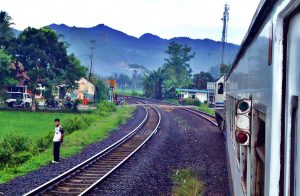Five years ago, Indonesian President Joko “Jokowi” Widodo awarded the $5.5 billion Jakarta-Bandung High Speed Rail project to a company from China. At the time, the project was hailed as a major win for Beijing, one that bolstered its Belt and Road Initiative (BRI) dream in Indonesia. Today, however, the project has turned into a nightmare, resulting in forced evictions, flooded roads, damaged houses and farmland, mass protests, and massive budget overruns, not to mention violations of at least six Indonesian laws. Despite an original May 2019 completion deadline, the Jakarta-Bandung High Speed Rail project is still going nowhere.
How did this happen, for such a high-profile project that enjoyed strong Indonesian government backing and Chinese financial support? Who bears responsibility? And ultimately, how can the Indonesian public believe China’s claims of a “green” BRI, when this supposed flagship project was crippled by many serious (and foreseeable) environmental and social flaws? If this rail project represented China’s ability to make good on its green BRI promises, then the current situation demonstrates its categorical failure to do so.
In many ways, the project, which aimed to connect the Indonesian capital to Bandung, the capital of West Java province, was doomed from the start due to a series of poor decisions and the misguided assumption that any infrastructure is inherently worth building. Project developers blatantly ignored major red flags related to the project’s design, sustainability, and legal compliance. Perhaps the biggest red flag, however, related to the failure of the project and its backers to obtain free, prior, informed consent of the communities that currently live along the proposed rail route.
According to local communities, the rail line will strip hundreds of households from their farmlands, thus dispossessing them of their traditional economic livelihoods. This fear has led to widespread, recurring protests along the proposed 142-kilometer rail route since 2015.
The Indonesian and Chinese governments’ claim that the rail line will yield economic benefits for the public rubs salt into the wound: local communities have countered that the Indonesian government should have prioritized infrastructure based on actual community needs like housing, as the high-speed train would primarily benefit elite Indonesians who could afford the pricey commute. Community consultations were not conducted based on free, prior, and informed consent (an international standard), nor was there fair compensation for those affected.
Neither would the project assuage Jakarta’s notorious traffic, as the high-speed rail would actually bring more people into the city, thus putting more people on its roads. Some reports argue that connecting Jakarta and Bandung by rail will yield economic benefits, but the reality is that those benefits will disproportionately favor Indonesian elites.
Public opposition has been so strong that the project has repeatedly stalled due to ongoing failures in land acquisition. This has even prompted the main financier, the state-owned China Development Bank, to withhold loan disbursement until 100 percent of land had been acquired. Even the Indonesian Air Force has resisted giving up land for the ill-conceived project.
For a project meant to showcase China’s BRI ambitions, it was also strange that the Chinese proponents of the railway never published their feasibility studies. Ensuring project transparency and information disclosure by sharing these documents would have undoubtedly improved public confidence and trust.
Furthermore, Indonesian law requires that an environmental impact assessment (EIA) for a project of this size to take 12 to 18 months. This EIA, however, was completed in a frightening seven days, critically neglecting key analysis about the the project’s likely impacts in terms of landslides, water catchment areas, and geologic faults. Neither did the project comply with legally required spatial layout plans; it wasn’t even included in the country’s National Railway Master Plan.
Ensuring fair land acquisition and compensation, basing community consultations on free, prior, and informed consent, conducting robust environmental and social impact analysis, complying fully with Indonesian law – any one of these issues alone could easily constitute a fatal flaw for any large infrastructure project. When combined altogether, however, is it any wonder that the high-speed rail project has failed so spectacularly?
Ultimately, responsibility falls on both Indonesian and Chinese proponents of the project: the Indonesian government for failing to enforce Indonesian laws, and the various Chinese parties for failing to respond to community concerns and follow obligatory Chinese environmental policies.
In 2016 and 2017, on behalf of local communities, Wahana Lingkungan Hidup Indonesia (WALHI) West Java sent repeated letters of concern to China Development Bank and Chinese government agencies regarding the above issues. To date, we have never received a response. It is possible that Chinese agencies believe that civil society and local people’s concerns are the business of the host country government. But this is perhaps the Chinese project proponents’ greatest mistake – if BRI is expected to succeed, whether in Indonesia or elsewhere, the interests and opinions of local communities and people should never be snubbed.
Since announcing the BRI, the Chinese government has published many policies and statements calling for robust environmental protection measures, meaningful consultations with impacted communities, and better information disclosure and transparency from Chinese companies and banks, so as to ensure “mutually beneficial” and “win-win” outcomes for both China and host countries. In this case, unfortunately, the Chinese developers and bank seemed to have missed these memos.
As a result, the ill-conceived and implemented high speed rail project may have potentially brought China’s BRI vision to an early, and unceremonious, end.
Meiki W Paendong is Executive Director of WALHI West Java, an environmental NGO based in Bandung. He has monitored Chinese overseas investments in Indonesia, particularly the Indonesia-China High Speed Rail Train project.

































